French presidential election 2017, Beethoven’s Ode to Joy, and the “We don’t need a king” bus ads in Toronto
May 8th, 2017 | By Counterweights Editors | Category: In Brief
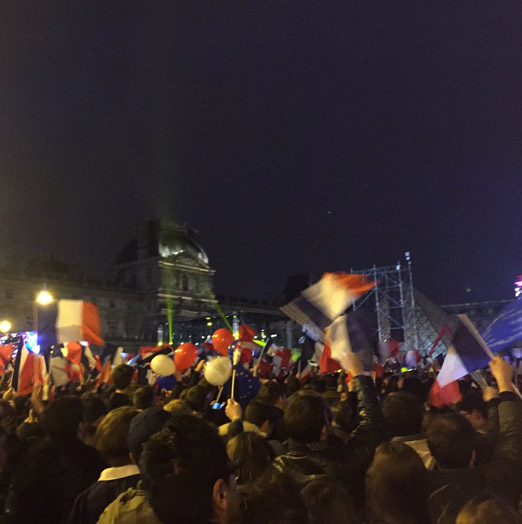
Macron arrives at Louvre museum Sunday night after his quite commanding victory in the second round of the 2017 French presidential election.
So, as all the polls predicted again, the centre-left Emmanuel Macron (or just straight centrist, as the anglophone mainstream media seem to have decided?) has quite handily defeated the far-right Front National leader Marine Le Pen (Donald Trump’s favourite?) for the presidency of the Fifth French Republic.
With all the vote now counted, 66.1% has gone to Macron, and a mere 33.9% to Le Pen.
According to the Associated Press : “Macron … celebrated with thousands of jubilant, flag-waving supporters outside the Louvre Museum in Paris on Sunday night … The European anthem ‘Ode to Joy’ played as he strode out to address the swelling crowd … ‘France has won!’ he said. ‘Everyone said it was impossible. But they do not know France!’”
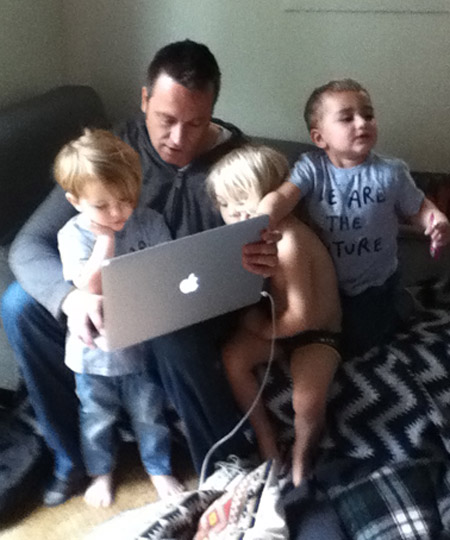
Receiving news of French election results in Northern California – homeland of the Resistance in the United States.
In our view the people of France – in the midst of all their own hard enough current struggles – have once again stood up for what is most hopeful and forward-looking in some larger contemporary history.
As a website on the subject explains, the undeniably clever bourgeois red doctor Karl Marx “wrote on many occasions about the French Revolution [1789—1799], which he considered … the classic example of the ‘bourgeois revolution,’ in which capitalism overthrew feudalism, creating the legal conditions under which capitalism could flourish.”
The best side of French democratic politics has continued to transcend its own narrowest concerns, and speak to broader worries of the world – from the first republic established by the revolution and then interrupted by Napoleon and so forth to the present fifth republic, established in 1958 at another crisis point in French history by Charles de Gaulle.
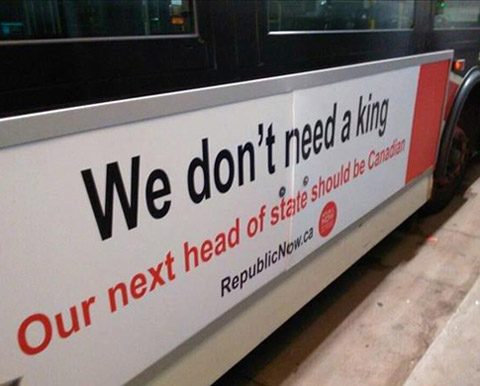
“We don’t need a king” bus ads appear in Toronto in between first and second rounds of French presidential election 2017. What they are proposing for Canada has a few similarities with what two-thirds of the French people have just chosen for France.
“La Marseillaise,” for example, a late 18th century “Chant de guerre” adopted by the revolutionary National Convention of 1795 as the republic’s national anthem, is in our view again easily the single best piece of words and music of its sort in the entire global village of 2017. It will forever have immense incontestable status as the national anthem of modern France.
Yet in striding to address his swelling crowd Sunday night to the strains of the European Union anthem “Ode to Joy” (aka the choral finale to the Ninth Symphony of the German classical composer Beethoven), President-elect Macron has shown that France today is still big and strong enough to stand up for the political progress long ago proposed by George Orwell in his “Toward European Unity” essay of 1947. (And for still larger themes of the free and democratic society, which also won endorsement from former US President Barack Obama.)
“Republican front” not necessary?
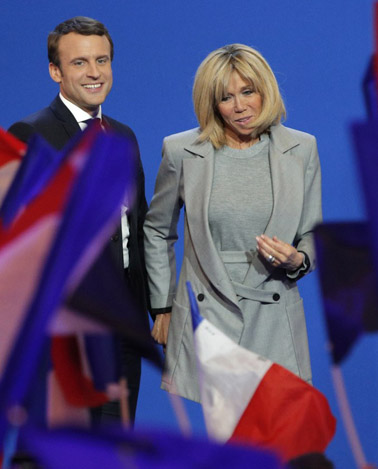
“Emmanuel Macron is 39 and his wife Brigitte. is 64. French women say it’s about time.” (Christophe Ena/Associated Press).
The prospect that Jeremy Harding, like others, worried about in a recent London Review of Books blog – hard-left supporters not turning out to vote for the “financier” Macron in the second round  – does seem to have happened. But it apparently did not really hurt Macron, to say nothing of seriously boost Le Pen.
Total voter turnout, eg (“Votants”), declined from 78% of registered voters (“Inscrits”) in the first round of voting on April 23 to 75% in the second round on May 7. Â Moreover in the second round only 66% of registered voters actually cast ballots for one or the other of the two final runoff candidates. More than 11% of those “Votants” who turned out in the second round voted either “Blancs” or “Nuls” – the two options French electoral law gives to voters who don’t like either of the human candidates but still want to participate, as they should.
It is also true that in the 2017 second round Marine Le Pen’s far right-wing Front National received almost double the percentage support her father Jean-Marie Le Pen’s Front National managed to garner against Jacques Chirac in 2002.
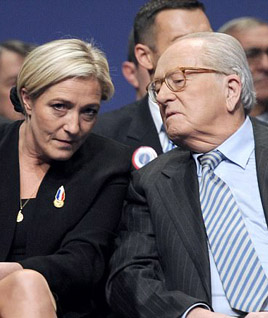
Marine Le Pen with her father Jean-Marie in 2011 – when they were still getting on better than they do now!
And Nahlah Ayed on the CBC News site certainly has a point (even several) in “France still faces formidable challenges: top among them is Marine Le Pen … After the election, far-right leader officially speaks for millions of unhappy French citizens.”
Yet the democratic people of France have still turned out in considerably greater percentages than in any Canadian or US election of recent memory to give almost two-thirds of their human-dedicated final vote to a young centrist (or even centre-left?) candidate, bound to remind Canadians of their current Liberal prime minister, Justin Trudeau.
Even the ghost of Charles de Gaulle might be pardoned for imagining that this francophone European populism puts “Les Anglo Saxons” to shame. Â (And note the Canadian Press on “Trudeau congratulates France’s president-elect Macron on election win.”)
“We don’t need a king” bus ads in Toronto
Canada shares both France and the United Kingdom as European mother countries (along with various indigenous North American Great Spirits, and much, much else from around the world).
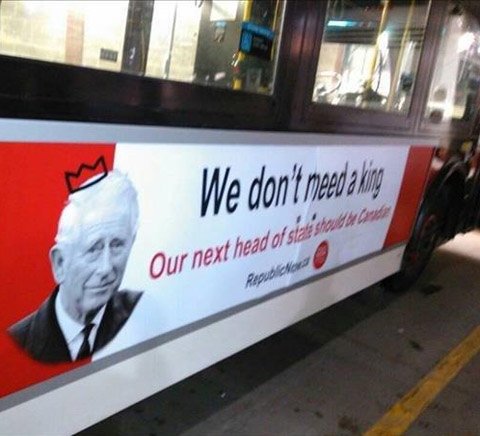 Intriguingly enough the period over which the 2017 French presidential election has taken place has coincided with the appearance of uniquely”free and democratic” public transit bus ads, in the current most populous Canadian city of Toronto.
Intriguingly enough the period over which the 2017 French presidential election has taken place has coincided with the appearance of uniquely”free and democratic” public transit bus ads, in the current most populous Canadian city of Toronto.
Next to a somewhat bemused photo of next-in-line Prince Charles, the ads proclaim : “We don’t need a king – Our next head of state should be Canadian.” They are sponsored by the democratic activist group Republic Now || République du Canada. (See their website : “We advocate a Canadian head of state for Canada. Our highest office should be held by someone who lives here, shares our citizenship, and is democratically selected.” On the ads in particular see “Ad campaign for a Canadian head of state unveiled today …  April 27, 2017.”)
Even more intriguingly again, it seems to us that the progressive, forward-looking future the “We don’t need a king” bus ads are proposing for Canada has at least a few similarities with what Emanuel Macron and two-thirds of the interested French people have just chosen for France.
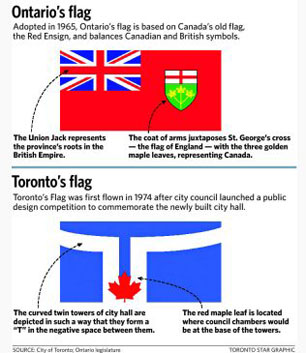
Comparison of current Ontario and Toronto flags, devised by someone at the Toronto Star, for Edward Keenan’s column : “Who needs Ontario when we’ve got Toronto?” Note Toronto is also the capital city of Ontario.
More exactly, we remember some words that we counterweights editors ourselves proposed almost two years ago now, in connection with a local media flap of the moment on the present Ontario flag (or “Huh. Ontario has a flag?” – as Edward Keenan at the Toronto Star put it) :
“It is certainly true that we are not yet ready, in Ontario or Canada at large, to start dealing altogether practically with such still unresolved essentially constitutional questions as the future of the British monarchy in Canada, Senate reform, Quebec in confederation, the rights of the aboriginal peoples of Canada, and even flags for such provinces as Manitoba and Ontario …
“But we need to be quite seriously debating these issues now, to marshal public opinion toward the kind of durable consensus that Martin Regg Cohn [also at the Toronto Star] has wisely argued must precede successful action. This won’t happen if the mainstream media keeps trying to confine this kind of debate to some point in the future that has not yet arrived.”
Our view of the “We don’t need a king” transit ads in Toronto this spring (with plans for Ottawa in the early summer, some say) is that they are trying to start just the kind of popular democratic debate on its future that the confederation celebrating its 150th anniversary this July 1 needs right now. And to paraphrase the new president-elect of France, “Everyone says it is impossible. But they do not know Canada!’”
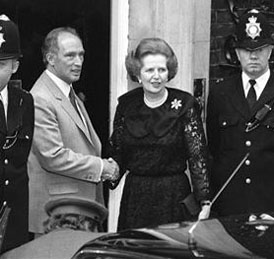
Pierre Trudeau tells Margaret Thatcher Canada is going to “patriate” its constitution from the United Kingdom – ultimately leading to what we now call the Constitution Act, 1982 and the Canadian Charter of Rights and Freedoms.
Who, in fact, does know? Perhaps someone in the Toronto mainstream media will notice one of the buses currently bearing the Republic Now || République du Canada transit ads, and think them worthy of reporting to a somewhat wider circle of fellow Canadians.
Meanwhile, there are probably already some bus riders who are thinking about the message : “We don’t need a king – Our next head of state should be Canadian.”
And eventually there will be some kind of constitutional conference where it will all be addressed, again, only this time with feeling … and success …
Just like in 1982 (except for Quebec), and 1992 (well, no, that was a failure : although the politicians agreed ; it was a popular referendum that killed the deal) – or even 1867, for that matter. Even in Canada such things do happen, from time to time … Opinion polls are starting to show that we mythical ordinary Canadians are starting to see this point, again : according to a recent Angus Reid survey “more than two-in-three say the issue of further reforming or abolishing the Senate is serious enough to merit re-opening Canada’s constitutional debate.”

